Analyzing Globalization: Economic Effects, Trade and Social Impact
VerifiedAdded on 2024/05/20
|16
|3032
|314
Essay
AI Summary
This essay provides a detailed overview of globalization, examining its impact on economic development, culture, political systems, and the environment. It traces the historical roots of globalization and discusses its acceleration in the 20th century. The essay explores both the positive and negative impacts of globalization, including increased trade, job opportunities in developing countries, and the transfer of technology. It also addresses concerns such as the exploitation of developing countries, environmental degradation, and cultural homogenization. The analysis includes examples such as McDonald's expansion and the Bhopal disaster to illustrate the multifaceted effects of globalization. The essay concludes by highlighting the complex interplay between economic growth, social well-being, and environmental sustainability in the context of an increasingly interconnected world. Desklib offers a range of study tools and resources for students exploring similar topics.
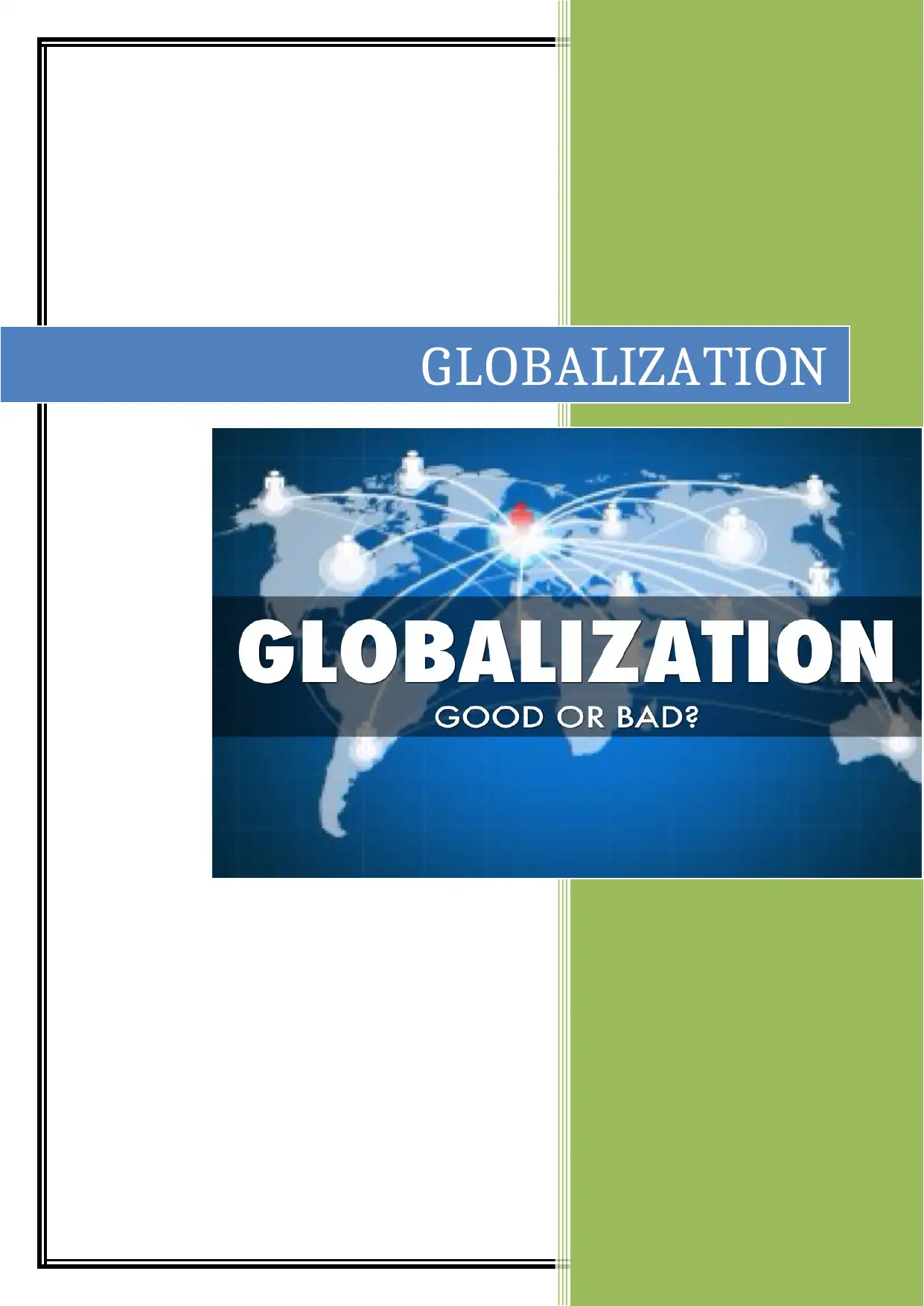
GLOBALIZATION
Paraphrase This Document
Need a fresh take? Get an instant paraphrase of this document with our AI Paraphraser

Contents
INTRODUCTION..........................................................................................................................2
GLOBALISATION.........................................................................................................................4
CONCLUSION............................................................................................................................13
REFERENCES.............................................................................................................................14
1
INTRODUCTION..........................................................................................................................2
GLOBALISATION.........................................................................................................................4
CONCLUSION............................................................................................................................13
REFERENCES.............................................................................................................................14
1
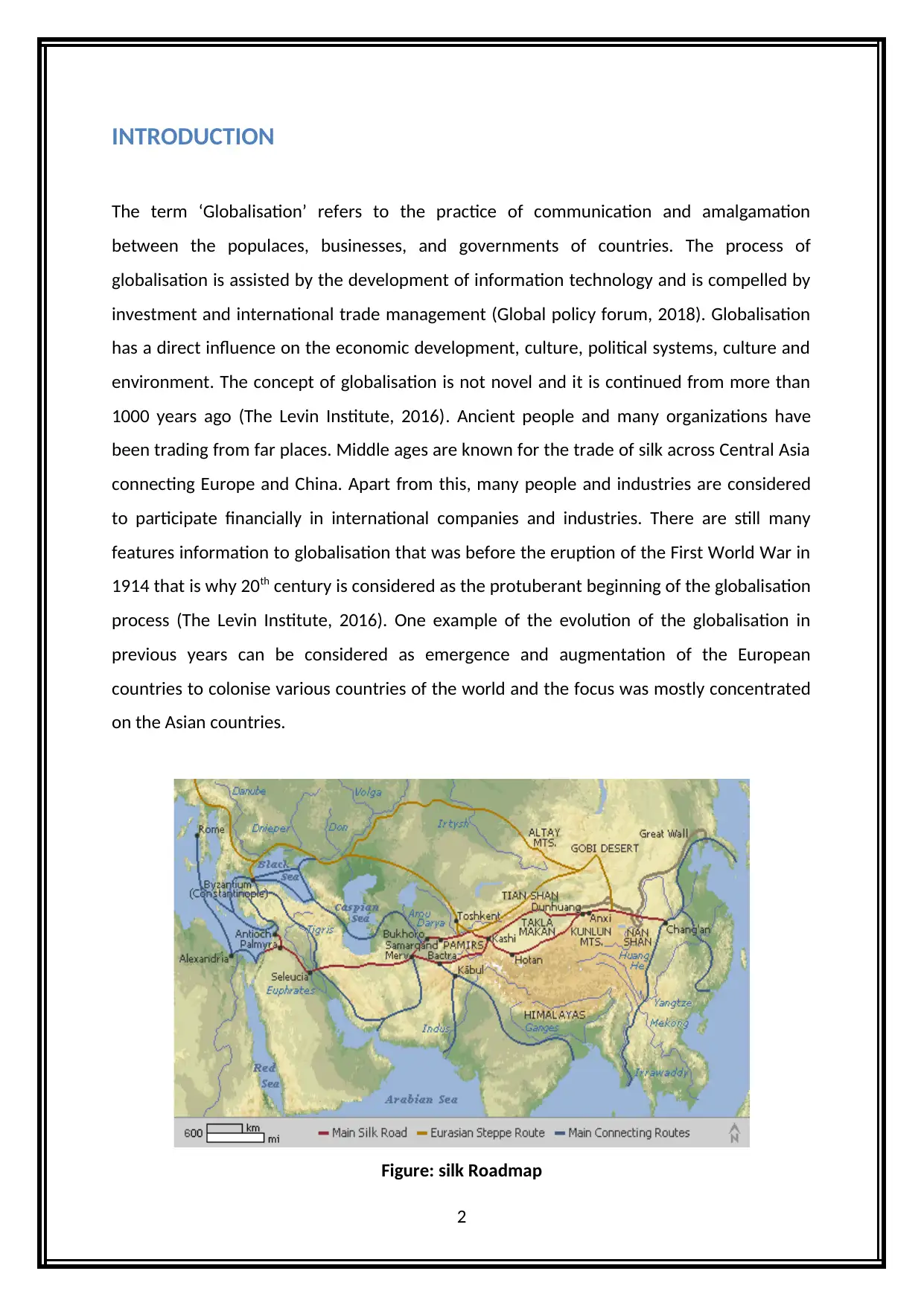
INTRODUCTION
The term ‘Globalisation’ refers to the practice of communication and amalgamation
between the populaces, businesses, and governments of countries. The process of
globalisation is assisted by the development of information technology and is compelled by
investment and international trade management (Global policy forum, 2018). Globalisation
has a direct influence on the economic development, culture, political systems, culture and
environment. The concept of globalisation is not novel and it is continued from more than
1000 years ago (The Levin Institute, 2016). Ancient people and many organizations have
been trading from far places. Middle ages are known for the trade of silk across Central Asia
connecting Europe and China. Apart from this, many people and industries are considered
to participate financially in international companies and industries. There are still many
features information to globalisation that was before the eruption of the First World War in
1914 that is why 20th century is considered as the protuberant beginning of the globalisation
process (The Levin Institute, 2016). One example of the evolution of the globalisation in
previous years can be considered as emergence and augmentation of the European
countries to colonise various countries of the world and the focus was mostly concentrated
on the Asian countries.
Figure: silk Roadmap
2
The term ‘Globalisation’ refers to the practice of communication and amalgamation
between the populaces, businesses, and governments of countries. The process of
globalisation is assisted by the development of information technology and is compelled by
investment and international trade management (Global policy forum, 2018). Globalisation
has a direct influence on the economic development, culture, political systems, culture and
environment. The concept of globalisation is not novel and it is continued from more than
1000 years ago (The Levin Institute, 2016). Ancient people and many organizations have
been trading from far places. Middle ages are known for the trade of silk across Central Asia
connecting Europe and China. Apart from this, many people and industries are considered
to participate financially in international companies and industries. There are still many
features information to globalisation that was before the eruption of the First World War in
1914 that is why 20th century is considered as the protuberant beginning of the globalisation
process (The Levin Institute, 2016). One example of the evolution of the globalisation in
previous years can be considered as emergence and augmentation of the European
countries to colonise various countries of the world and the focus was mostly concentrated
on the Asian countries.
Figure: silk Roadmap
2
⊘ This is a preview!⊘
Do you want full access?
Subscribe today to unlock all pages.

Trusted by 1+ million students worldwide

[Source: http://www.globalization101.org/what-is-globalization/]
The impact of globalisation is in every region of the areas comprising indigenous as well as
poor people. Almost every aspect, every sector has now considered as a part of
globalisation. Nowadays, the remote areas are also considered as a part of globalisation. It is
knitting the humanities to form a world culture together (KUEPPER, 2017). The term is seen
as an easy concept but it is difficult to understand and apply.
3
The impact of globalisation is in every region of the areas comprising indigenous as well as
poor people. Almost every aspect, every sector has now considered as a part of
globalisation. Nowadays, the remote areas are also considered as a part of globalisation. It is
knitting the humanities to form a world culture together (KUEPPER, 2017). The term is seen
as an easy concept but it is difficult to understand and apply.
3
Paraphrase This Document
Need a fresh take? Get an instant paraphrase of this document with our AI Paraphraser
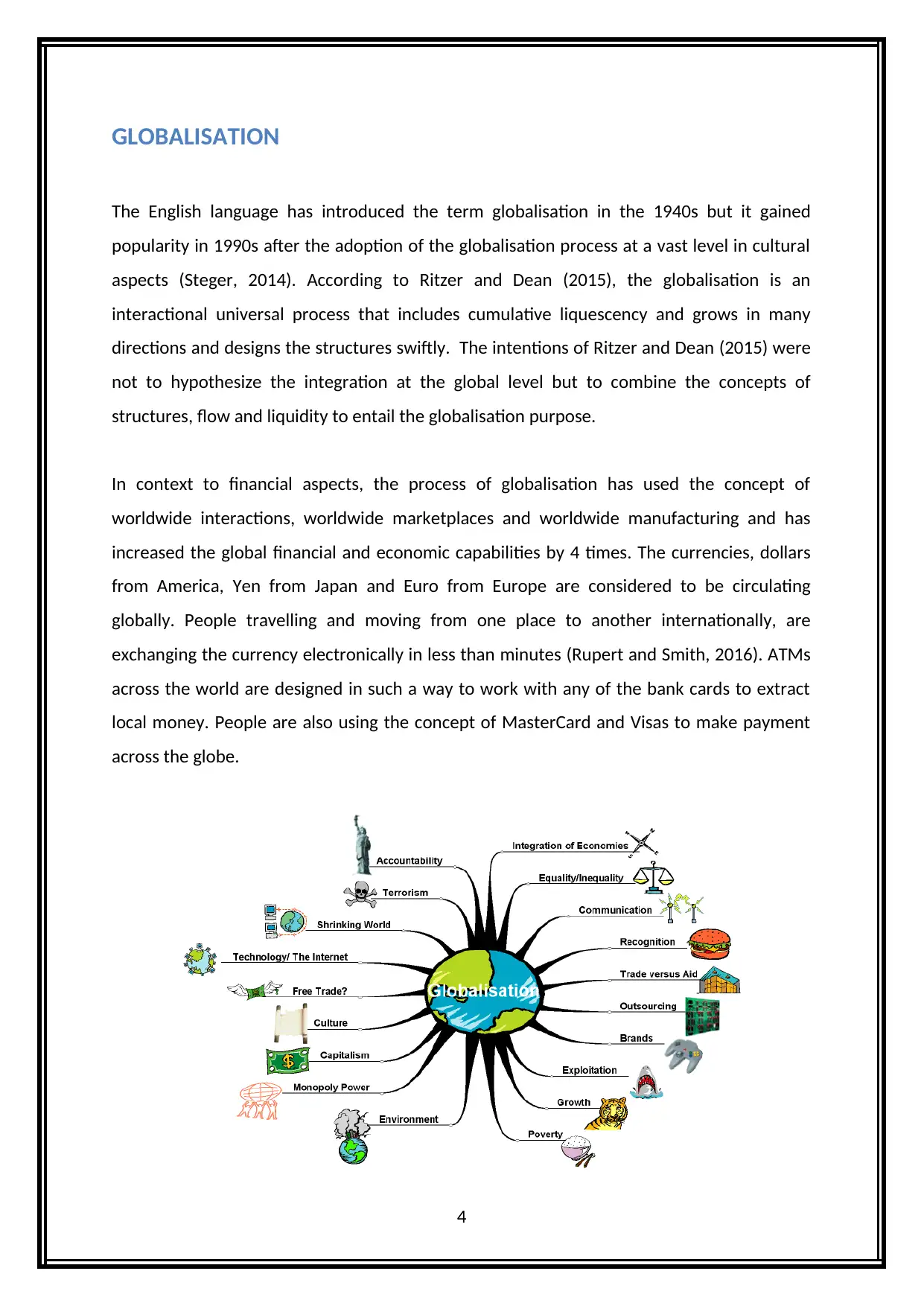
GLOBALISATION
The English language has introduced the term globalisation in the 1940s but it gained
popularity in 1990s after the adoption of the globalisation process at a vast level in cultural
aspects (Steger, 2014). According to Ritzer and Dean (2015), the globalisation is an
interactional universal process that includes cumulative liquescency and grows in many
directions and designs the structures swiftly. The intentions of Ritzer and Dean (2015) were
not to hypothesize the integration at the global level but to combine the concepts of
structures, flow and liquidity to entail the globalisation purpose.
In context to financial aspects, the process of globalisation has used the concept of
worldwide interactions, worldwide marketplaces and worldwide manufacturing and has
increased the global financial and economic capabilities by 4 times. The currencies, dollars
from America, Yen from Japan and Euro from Europe are considered to be circulating
globally. People travelling and moving from one place to another internationally, are
exchanging the currency electronically in less than minutes (Rupert and Smith, 2016). ATMs
across the world are designed in such a way to work with any of the bank cards to extract
local money. People are also using the concept of MasterCard and Visas to make payment
across the globe.
4
The English language has introduced the term globalisation in the 1940s but it gained
popularity in 1990s after the adoption of the globalisation process at a vast level in cultural
aspects (Steger, 2014). According to Ritzer and Dean (2015), the globalisation is an
interactional universal process that includes cumulative liquescency and grows in many
directions and designs the structures swiftly. The intentions of Ritzer and Dean (2015) were
not to hypothesize the integration at the global level but to combine the concepts of
structures, flow and liquidity to entail the globalisation purpose.
In context to financial aspects, the process of globalisation has used the concept of
worldwide interactions, worldwide marketplaces and worldwide manufacturing and has
increased the global financial and economic capabilities by 4 times. The currencies, dollars
from America, Yen from Japan and Euro from Europe are considered to be circulating
globally. People travelling and moving from one place to another internationally, are
exchanging the currency electronically in less than minutes (Rupert and Smith, 2016). ATMs
across the world are designed in such a way to work with any of the bank cards to extract
local money. People are also using the concept of MasterCard and Visas to make payment
across the globe.
4
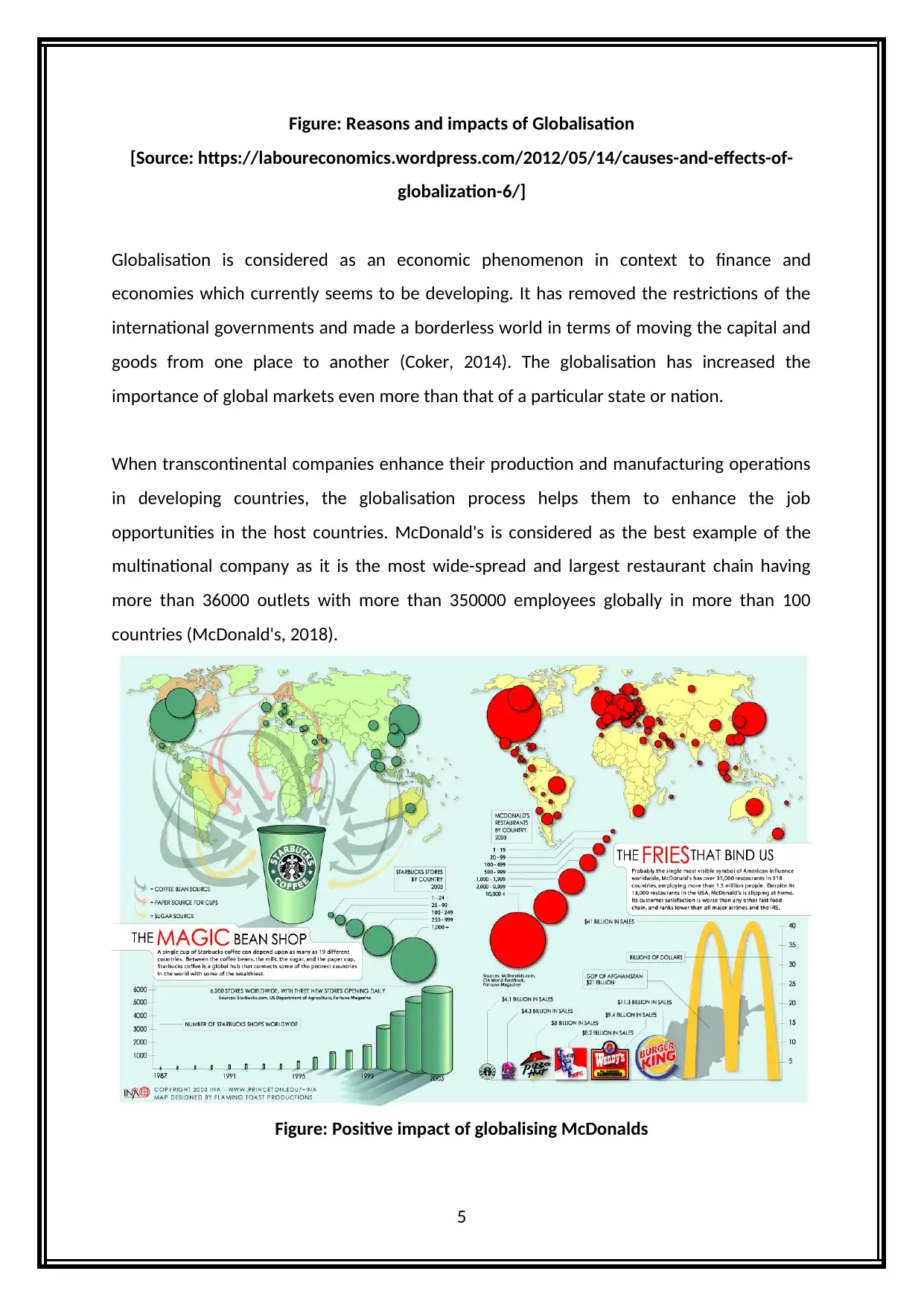
Figure: Reasons and impacts of Globalisation
[Source: https://laboureconomics.wordpress.com/2012/05/14/causes-and-effects-of-
globalization-6/]
Globalisation is considered as an economic phenomenon in context to finance and
economies which currently seems to be developing. It has removed the restrictions of the
international governments and made a borderless world in terms of moving the capital and
goods from one place to another (Coker, 2014). The globalisation has increased the
importance of global markets even more than that of a particular state or nation.
When transcontinental companies enhance their production and manufacturing operations
in developing countries, the globalisation process helps them to enhance the job
opportunities in the host countries. McDonald's is considered as the best example of the
multinational company as it is the most wide-spread and largest restaurant chain having
more than 36000 outlets with more than 350000 employees globally in more than 100
countries (McDonald's, 2018).
Figure: Positive impact of globalising McDonalds
5
[Source: https://laboureconomics.wordpress.com/2012/05/14/causes-and-effects-of-
globalization-6/]
Globalisation is considered as an economic phenomenon in context to finance and
economies which currently seems to be developing. It has removed the restrictions of the
international governments and made a borderless world in terms of moving the capital and
goods from one place to another (Coker, 2014). The globalisation has increased the
importance of global markets even more than that of a particular state or nation.
When transcontinental companies enhance their production and manufacturing operations
in developing countries, the globalisation process helps them to enhance the job
opportunities in the host countries. McDonald's is considered as the best example of the
multinational company as it is the most wide-spread and largest restaurant chain having
more than 36000 outlets with more than 350000 employees globally in more than 100
countries (McDonald's, 2018).
Figure: Positive impact of globalising McDonalds
5
⊘ This is a preview!⊘
Do you want full access?
Subscribe today to unlock all pages.

Trusted by 1+ million students worldwide
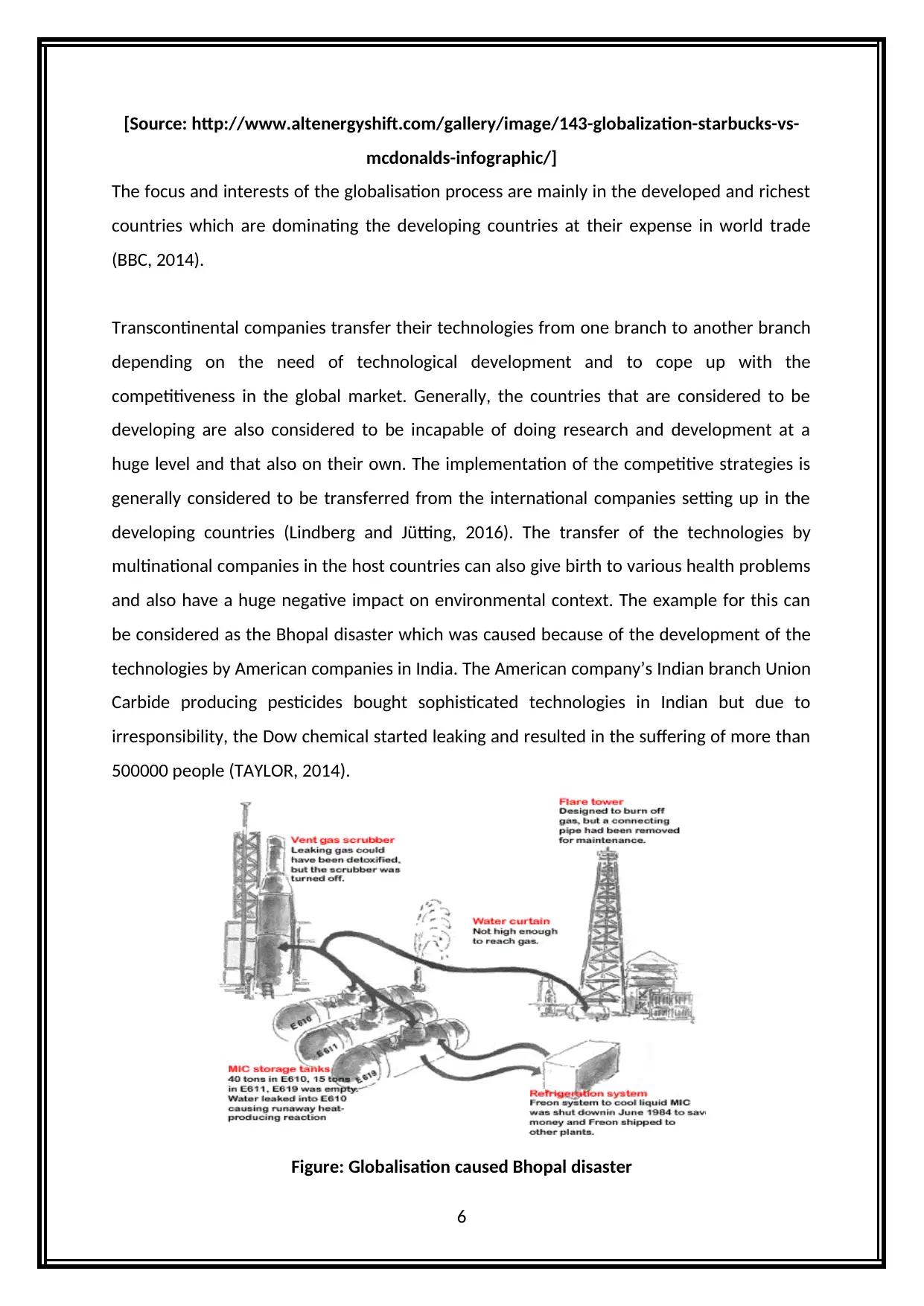
[Source: http://www.altenergyshift.com/gallery/image/143-globalization-starbucks-vs-
mcdonalds-infographic/]
The focus and interests of the globalisation process are mainly in the developed and richest
countries which are dominating the developing countries at their expense in world trade
(BBC, 2014).
Transcontinental companies transfer their technologies from one branch to another branch
depending on the need of technological development and to cope up with the
competitiveness in the global market. Generally, the countries that are considered to be
developing are also considered to be incapable of doing research and development at a
huge level and that also on their own. The implementation of the competitive strategies is
generally considered to be transferred from the international companies setting up in the
developing countries (Lindberg and Jütting, 2016). The transfer of the technologies by
multinational companies in the host countries can also give birth to various health problems
and also have a huge negative impact on environmental context. The example for this can
be considered as the Bhopal disaster which was caused because of the development of the
technologies by American companies in India. The American company’s Indian branch Union
Carbide producing pesticides bought sophisticated technologies in Indian but due to
irresponsibility, the Dow chemical started leaking and resulted in the suffering of more than
500000 people (TAYLOR, 2014).
Figure: Globalisation caused Bhopal disaster
6
mcdonalds-infographic/]
The focus and interests of the globalisation process are mainly in the developed and richest
countries which are dominating the developing countries at their expense in world trade
(BBC, 2014).
Transcontinental companies transfer their technologies from one branch to another branch
depending on the need of technological development and to cope up with the
competitiveness in the global market. Generally, the countries that are considered to be
developing are also considered to be incapable of doing research and development at a
huge level and that also on their own. The implementation of the competitive strategies is
generally considered to be transferred from the international companies setting up in the
developing countries (Lindberg and Jütting, 2016). The transfer of the technologies by
multinational companies in the host countries can also give birth to various health problems
and also have a huge negative impact on environmental context. The example for this can
be considered as the Bhopal disaster which was caused because of the development of the
technologies by American companies in India. The American company’s Indian branch Union
Carbide producing pesticides bought sophisticated technologies in Indian but due to
irresponsibility, the Dow chemical started leaking and resulted in the suffering of more than
500000 people (TAYLOR, 2014).
Figure: Globalisation caused Bhopal disaster
6
Paraphrase This Document
Need a fresh take? Get an instant paraphrase of this document with our AI Paraphraser
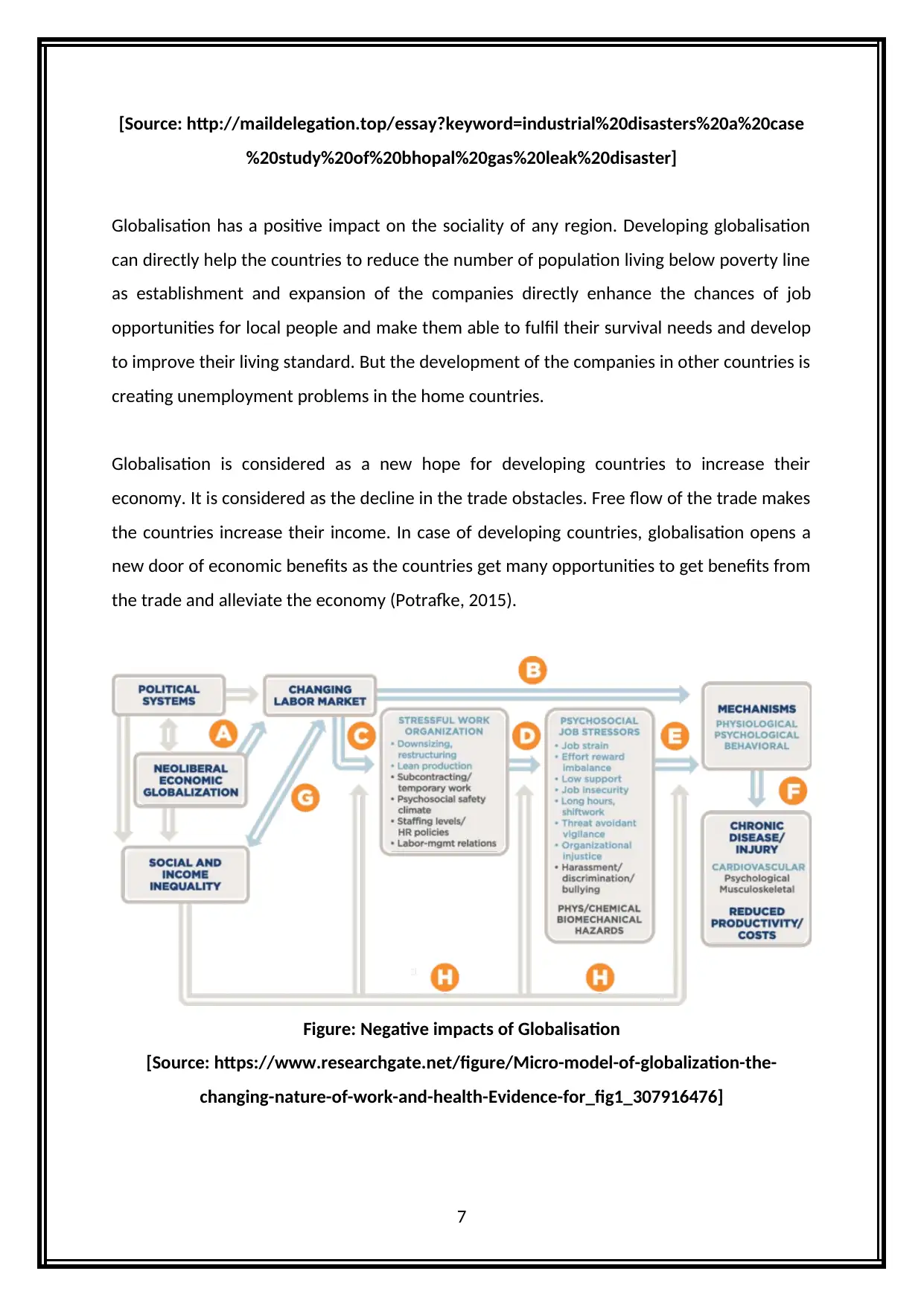
[Source: http://maildelegation.top/essay?keyword=industrial%20disasters%20a%20case
%20study%20of%20bhopal%20gas%20leak%20disaster]
Globalisation has a positive impact on the sociality of any region. Developing globalisation
can directly help the countries to reduce the number of population living below poverty line
as establishment and expansion of the companies directly enhance the chances of job
opportunities for local people and make them able to fulfil their survival needs and develop
to improve their living standard. But the development of the companies in other countries is
creating unemployment problems in the home countries.
Globalisation is considered as a new hope for developing countries to increase their
economy. It is considered as the decline in the trade obstacles. Free flow of the trade makes
the countries increase their income. In case of developing countries, globalisation opens a
new door of economic benefits as the countries get many opportunities to get benefits from
the trade and alleviate the economy (Potrafke, 2015).
Figure: Negative impacts of Globalisation
[Source: https://www.researchgate.net/figure/Micro-model-of-globalization-the-
changing-nature-of-work-and-health-Evidence-for_fig1_307916476]
7
%20study%20of%20bhopal%20gas%20leak%20disaster]
Globalisation has a positive impact on the sociality of any region. Developing globalisation
can directly help the countries to reduce the number of population living below poverty line
as establishment and expansion of the companies directly enhance the chances of job
opportunities for local people and make them able to fulfil their survival needs and develop
to improve their living standard. But the development of the companies in other countries is
creating unemployment problems in the home countries.
Globalisation is considered as a new hope for developing countries to increase their
economy. It is considered as the decline in the trade obstacles. Free flow of the trade makes
the countries increase their income. In case of developing countries, globalisation opens a
new door of economic benefits as the countries get many opportunities to get benefits from
the trade and alleviate the economy (Potrafke, 2015).
Figure: Negative impacts of Globalisation
[Source: https://www.researchgate.net/figure/Micro-model-of-globalization-the-
changing-nature-of-work-and-health-Evidence-for_fig1_307916476]
7
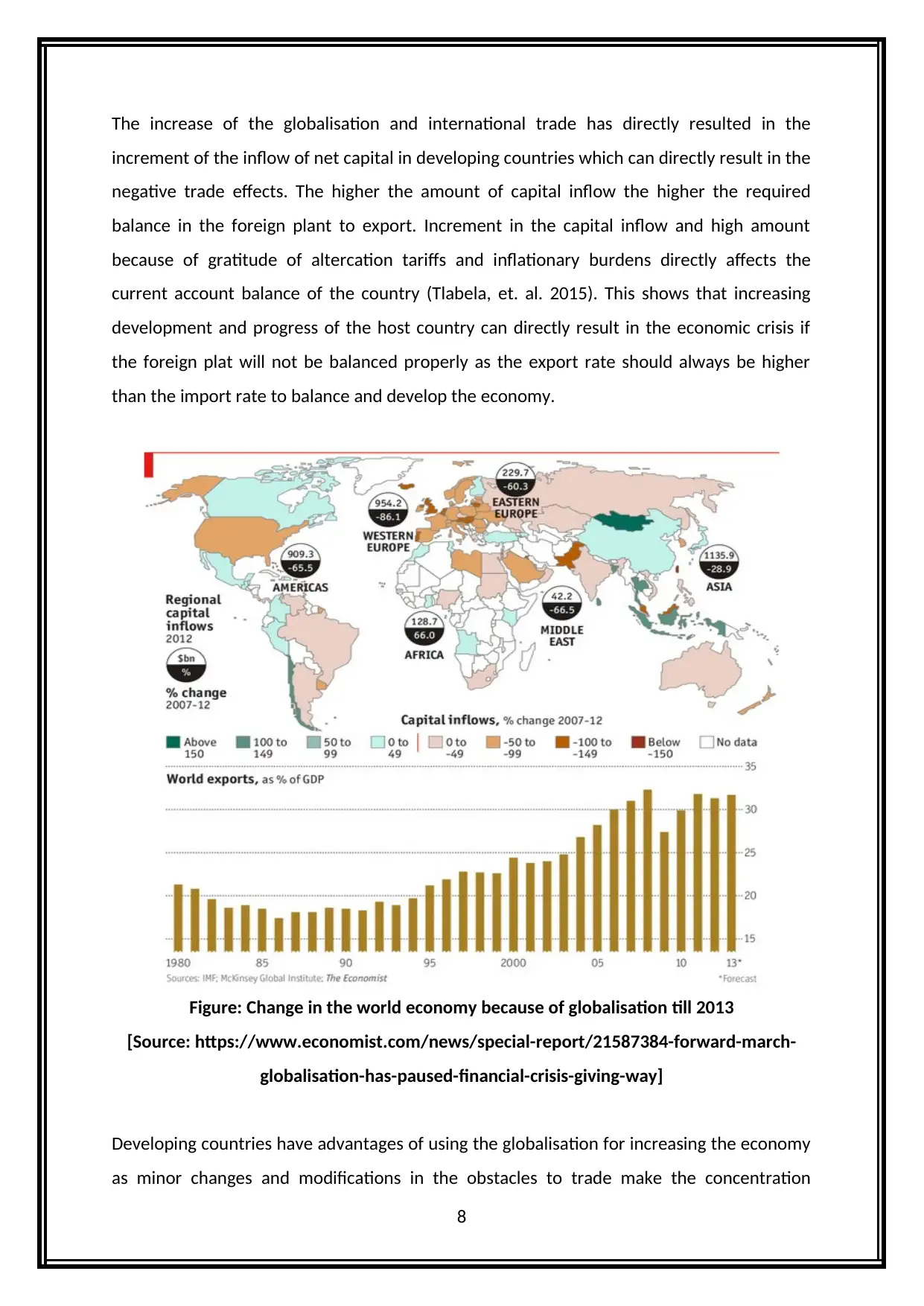
The increase of the globalisation and international trade has directly resulted in the
increment of the inflow of net capital in developing countries which can directly result in the
negative trade effects. The higher the amount of capital inflow the higher the required
balance in the foreign plant to export. Increment in the capital inflow and high amount
because of gratitude of altercation tariffs and inflationary burdens directly affects the
current account balance of the country (Tlabela, et. al. 2015). This shows that increasing
development and progress of the host country can directly result in the economic crisis if
the foreign plat will not be balanced properly as the export rate should always be higher
than the import rate to balance and develop the economy.
Figure: Change in the world economy because of globalisation till 2013
[Source: https://www.economist.com/news/special-report/21587384-forward-march-
globalisation-has-paused-financial-crisis-giving-way]
Developing countries have advantages of using the globalisation for increasing the economy
as minor changes and modifications in the obstacles to trade make the concentration
8
increment of the inflow of net capital in developing countries which can directly result in the
negative trade effects. The higher the amount of capital inflow the higher the required
balance in the foreign plant to export. Increment in the capital inflow and high amount
because of gratitude of altercation tariffs and inflationary burdens directly affects the
current account balance of the country (Tlabela, et. al. 2015). This shows that increasing
development and progress of the host country can directly result in the economic crisis if
the foreign plat will not be balanced properly as the export rate should always be higher
than the import rate to balance and develop the economy.
Figure: Change in the world economy because of globalisation till 2013
[Source: https://www.economist.com/news/special-report/21587384-forward-march-
globalisation-has-paused-financial-crisis-giving-way]
Developing countries have advantages of using the globalisation for increasing the economy
as minor changes and modifications in the obstacles to trade make the concentration
8
⊘ This is a preview!⊘
Do you want full access?
Subscribe today to unlock all pages.

Trusted by 1+ million students worldwide
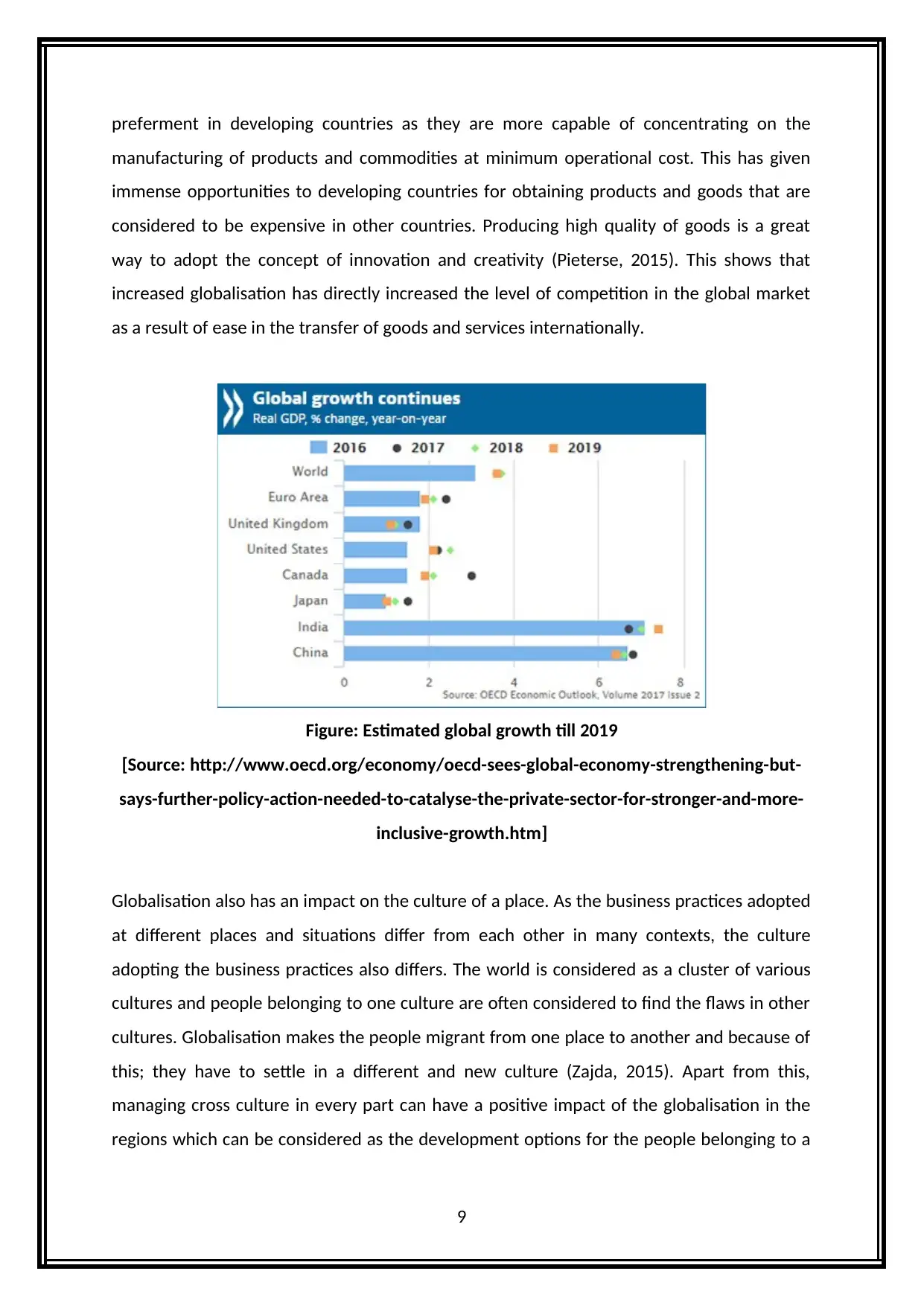
preferment in developing countries as they are more capable of concentrating on the
manufacturing of products and commodities at minimum operational cost. This has given
immense opportunities to developing countries for obtaining products and goods that are
considered to be expensive in other countries. Producing high quality of goods is a great
way to adopt the concept of innovation and creativity (Pieterse, 2015). This shows that
increased globalisation has directly increased the level of competition in the global market
as a result of ease in the transfer of goods and services internationally.
Figure: Estimated global growth till 2019
[Source: http://www.oecd.org/economy/oecd-sees-global-economy-strengthening-but-
says-further-policy-action-needed-to-catalyse-the-private-sector-for-stronger-and-more-
inclusive-growth.htm]
Globalisation also has an impact on the culture of a place. As the business practices adopted
at different places and situations differ from each other in many contexts, the culture
adopting the business practices also differs. The world is considered as a cluster of various
cultures and people belonging to one culture are often considered to find the flaws in other
cultures. Globalisation makes the people migrant from one place to another and because of
this; they have to settle in a different and new culture (Zajda, 2015). Apart from this,
managing cross culture in every part can have a positive impact of the globalisation in the
regions which can be considered as the development options for the people belonging to a
9
manufacturing of products and commodities at minimum operational cost. This has given
immense opportunities to developing countries for obtaining products and goods that are
considered to be expensive in other countries. Producing high quality of goods is a great
way to adopt the concept of innovation and creativity (Pieterse, 2015). This shows that
increased globalisation has directly increased the level of competition in the global market
as a result of ease in the transfer of goods and services internationally.
Figure: Estimated global growth till 2019
[Source: http://www.oecd.org/economy/oecd-sees-global-economy-strengthening-but-
says-further-policy-action-needed-to-catalyse-the-private-sector-for-stronger-and-more-
inclusive-growth.htm]
Globalisation also has an impact on the culture of a place. As the business practices adopted
at different places and situations differ from each other in many contexts, the culture
adopting the business practices also differs. The world is considered as a cluster of various
cultures and people belonging to one culture are often considered to find the flaws in other
cultures. Globalisation makes the people migrant from one place to another and because of
this; they have to settle in a different and new culture (Zajda, 2015). Apart from this,
managing cross culture in every part can have a positive impact of the globalisation in the
regions which can be considered as the development options for the people belonging to a
9
Paraphrase This Document
Need a fresh take? Get an instant paraphrase of this document with our AI Paraphraser
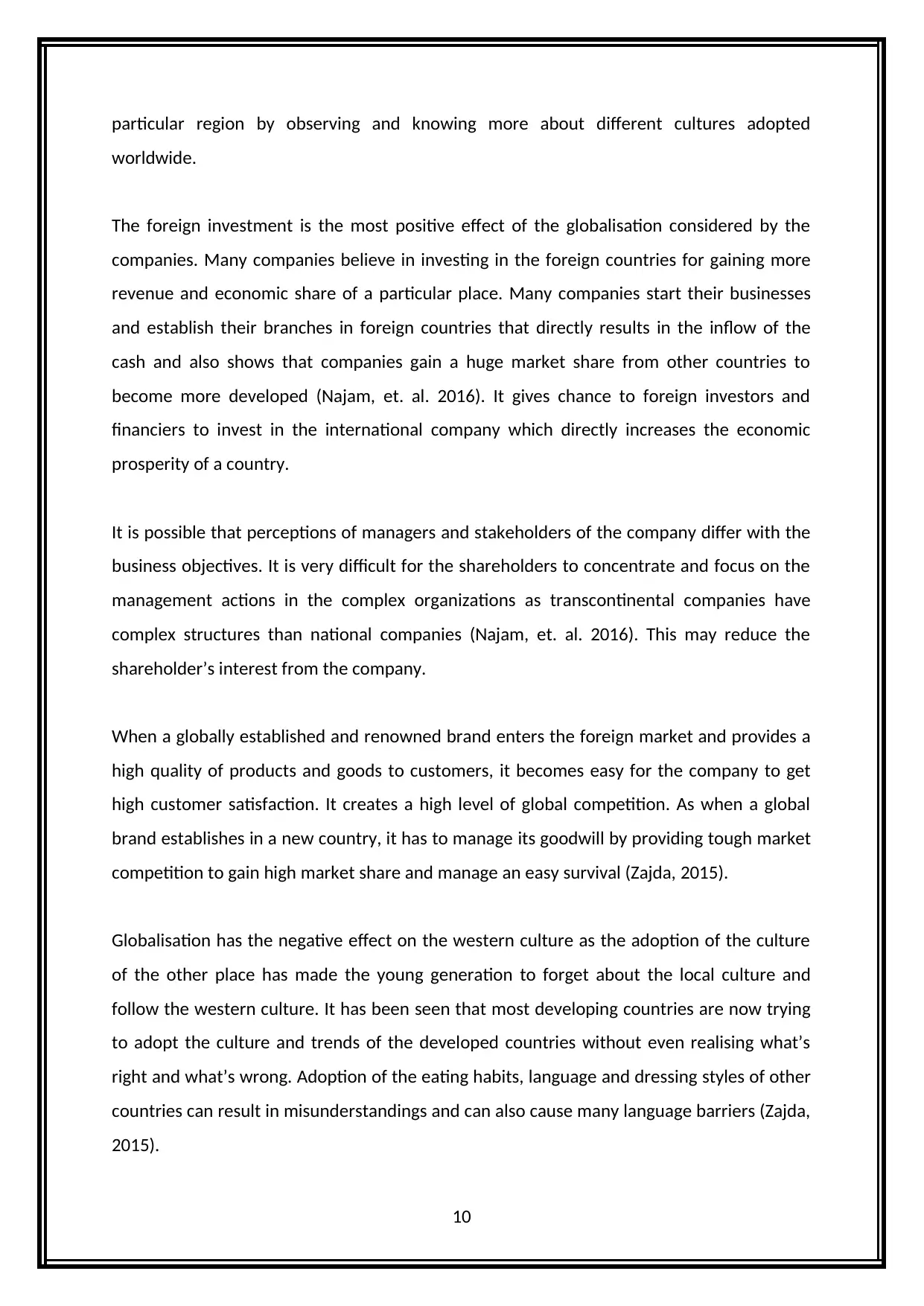
particular region by observing and knowing more about different cultures adopted
worldwide.
The foreign investment is the most positive effect of the globalisation considered by the
companies. Many companies believe in investing in the foreign countries for gaining more
revenue and economic share of a particular place. Many companies start their businesses
and establish their branches in foreign countries that directly results in the inflow of the
cash and also shows that companies gain a huge market share from other countries to
become more developed (Najam, et. al. 2016). It gives chance to foreign investors and
financiers to invest in the international company which directly increases the economic
prosperity of a country.
It is possible that perceptions of managers and stakeholders of the company differ with the
business objectives. It is very difficult for the shareholders to concentrate and focus on the
management actions in the complex organizations as transcontinental companies have
complex structures than national companies (Najam, et. al. 2016). This may reduce the
shareholder’s interest from the company.
When a globally established and renowned brand enters the foreign market and provides a
high quality of products and goods to customers, it becomes easy for the company to get
high customer satisfaction. It creates a high level of global competition. As when a global
brand establishes in a new country, it has to manage its goodwill by providing tough market
competition to gain high market share and manage an easy survival (Zajda, 2015).
Globalisation has the negative effect on the western culture as the adoption of the culture
of the other place has made the young generation to forget about the local culture and
follow the western culture. It has been seen that most developing countries are now trying
to adopt the culture and trends of the developed countries without even realising what’s
right and what’s wrong. Adoption of the eating habits, language and dressing styles of other
countries can result in misunderstandings and can also cause many language barriers (Zajda,
2015).
10
worldwide.
The foreign investment is the most positive effect of the globalisation considered by the
companies. Many companies believe in investing in the foreign countries for gaining more
revenue and economic share of a particular place. Many companies start their businesses
and establish their branches in foreign countries that directly results in the inflow of the
cash and also shows that companies gain a huge market share from other countries to
become more developed (Najam, et. al. 2016). It gives chance to foreign investors and
financiers to invest in the international company which directly increases the economic
prosperity of a country.
It is possible that perceptions of managers and stakeholders of the company differ with the
business objectives. It is very difficult for the shareholders to concentrate and focus on the
management actions in the complex organizations as transcontinental companies have
complex structures than national companies (Najam, et. al. 2016). This may reduce the
shareholder’s interest from the company.
When a globally established and renowned brand enters the foreign market and provides a
high quality of products and goods to customers, it becomes easy for the company to get
high customer satisfaction. It creates a high level of global competition. As when a global
brand establishes in a new country, it has to manage its goodwill by providing tough market
competition to gain high market share and manage an easy survival (Zajda, 2015).
Globalisation has the negative effect on the western culture as the adoption of the culture
of the other place has made the young generation to forget about the local culture and
follow the western culture. It has been seen that most developing countries are now trying
to adopt the culture and trends of the developed countries without even realising what’s
right and what’s wrong. Adoption of the eating habits, language and dressing styles of other
countries can result in misunderstandings and can also cause many language barriers (Zajda,
2015).
10
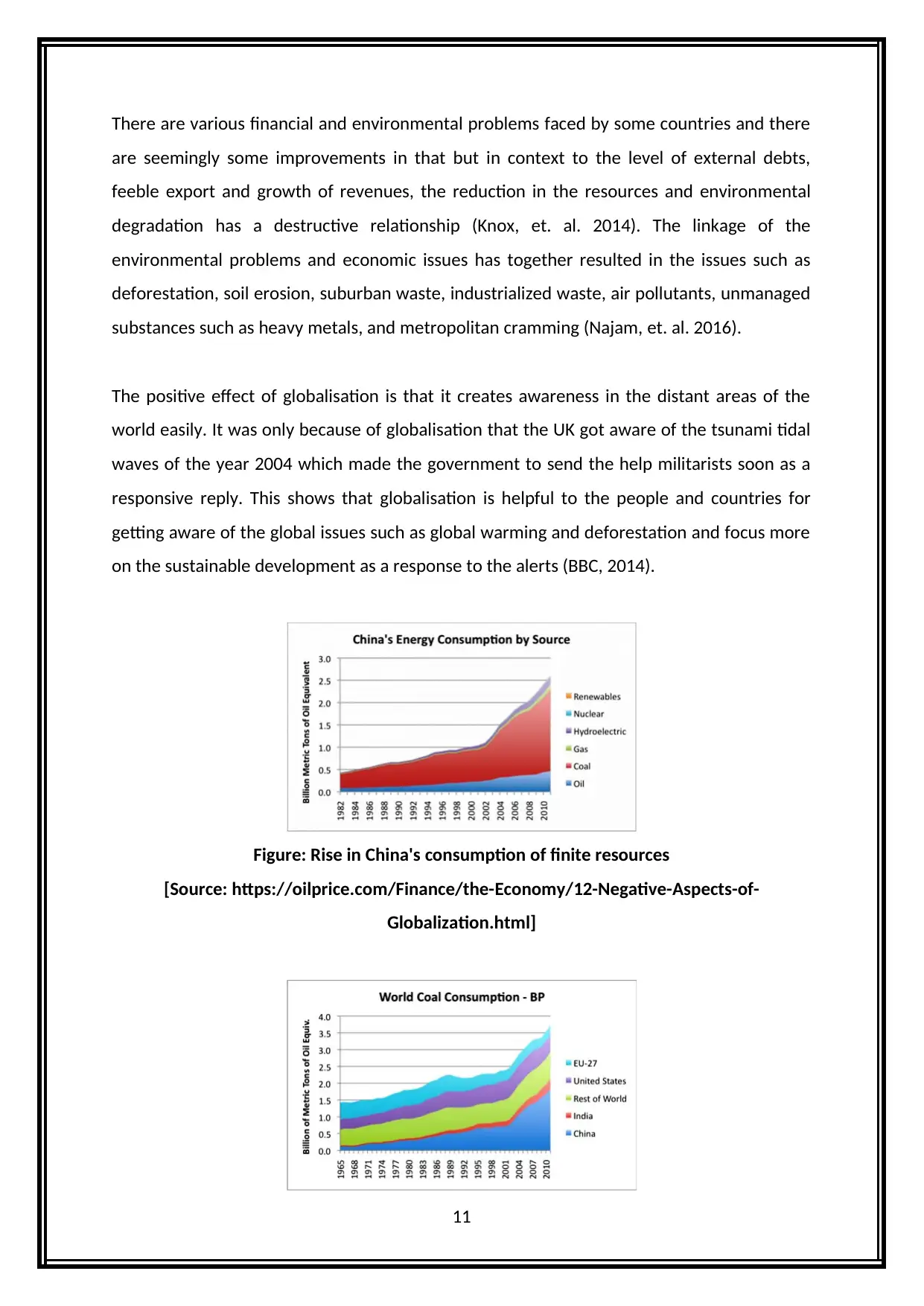
There are various financial and environmental problems faced by some countries and there
are seemingly some improvements in that but in context to the level of external debts,
feeble export and growth of revenues, the reduction in the resources and environmental
degradation has a destructive relationship (Knox, et. al. 2014). The linkage of the
environmental problems and economic issues has together resulted in the issues such as
deforestation, soil erosion, suburban waste, industrialized waste, air pollutants, unmanaged
substances such as heavy metals, and metropolitan cramming (Najam, et. al. 2016).
The positive effect of globalisation is that it creates awareness in the distant areas of the
world easily. It was only because of globalisation that the UK got aware of the tsunami tidal
waves of the year 2004 which made the government to send the help militarists soon as a
responsive reply. This shows that globalisation is helpful to the people and countries for
getting aware of the global issues such as global warming and deforestation and focus more
on the sustainable development as a response to the alerts (BBC, 2014).
Figure: Rise in China's consumption of finite resources
[Source: https://oilprice.com/Finance/the-Economy/12-Negative-Aspects-of-
Globalization.html]
11
are seemingly some improvements in that but in context to the level of external debts,
feeble export and growth of revenues, the reduction in the resources and environmental
degradation has a destructive relationship (Knox, et. al. 2014). The linkage of the
environmental problems and economic issues has together resulted in the issues such as
deforestation, soil erosion, suburban waste, industrialized waste, air pollutants, unmanaged
substances such as heavy metals, and metropolitan cramming (Najam, et. al. 2016).
The positive effect of globalisation is that it creates awareness in the distant areas of the
world easily. It was only because of globalisation that the UK got aware of the tsunami tidal
waves of the year 2004 which made the government to send the help militarists soon as a
responsive reply. This shows that globalisation is helpful to the people and countries for
getting aware of the global issues such as global warming and deforestation and focus more
on the sustainable development as a response to the alerts (BBC, 2014).
Figure: Rise in China's consumption of finite resources
[Source: https://oilprice.com/Finance/the-Economy/12-Negative-Aspects-of-
Globalization.html]
11
⊘ This is a preview!⊘
Do you want full access?
Subscribe today to unlock all pages.

Trusted by 1+ million students worldwide
1 out of 16
Related Documents
Your All-in-One AI-Powered Toolkit for Academic Success.
+13062052269
info@desklib.com
Available 24*7 on WhatsApp / Email
![[object Object]](/_next/static/media/star-bottom.7253800d.svg)
Unlock your academic potential
Copyright © 2020–2026 A2Z Services. All Rights Reserved. Developed and managed by ZUCOL.



